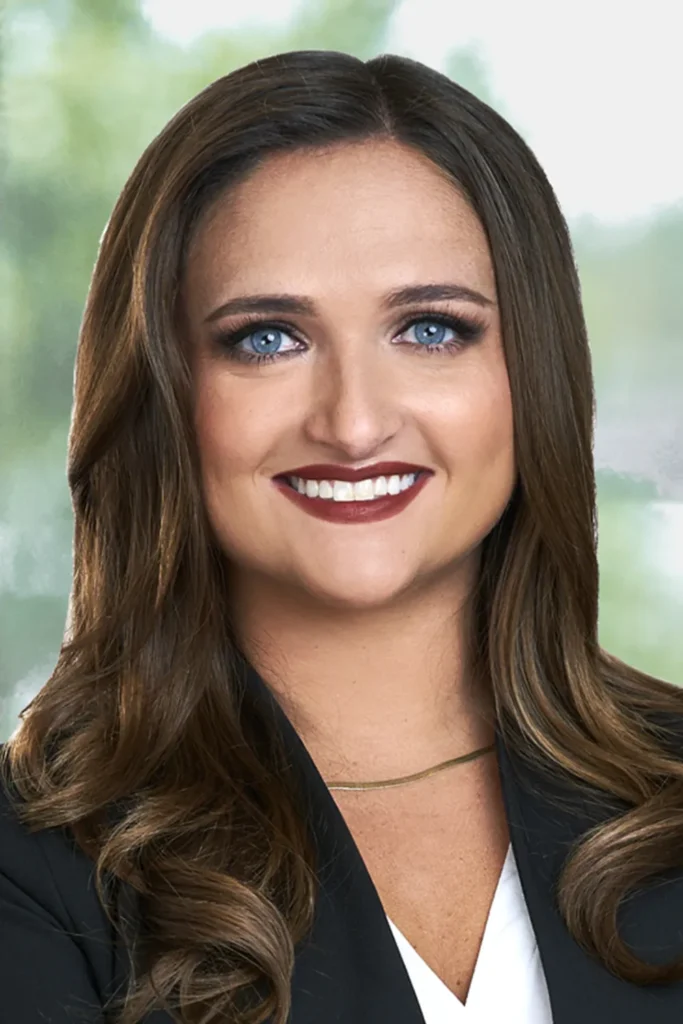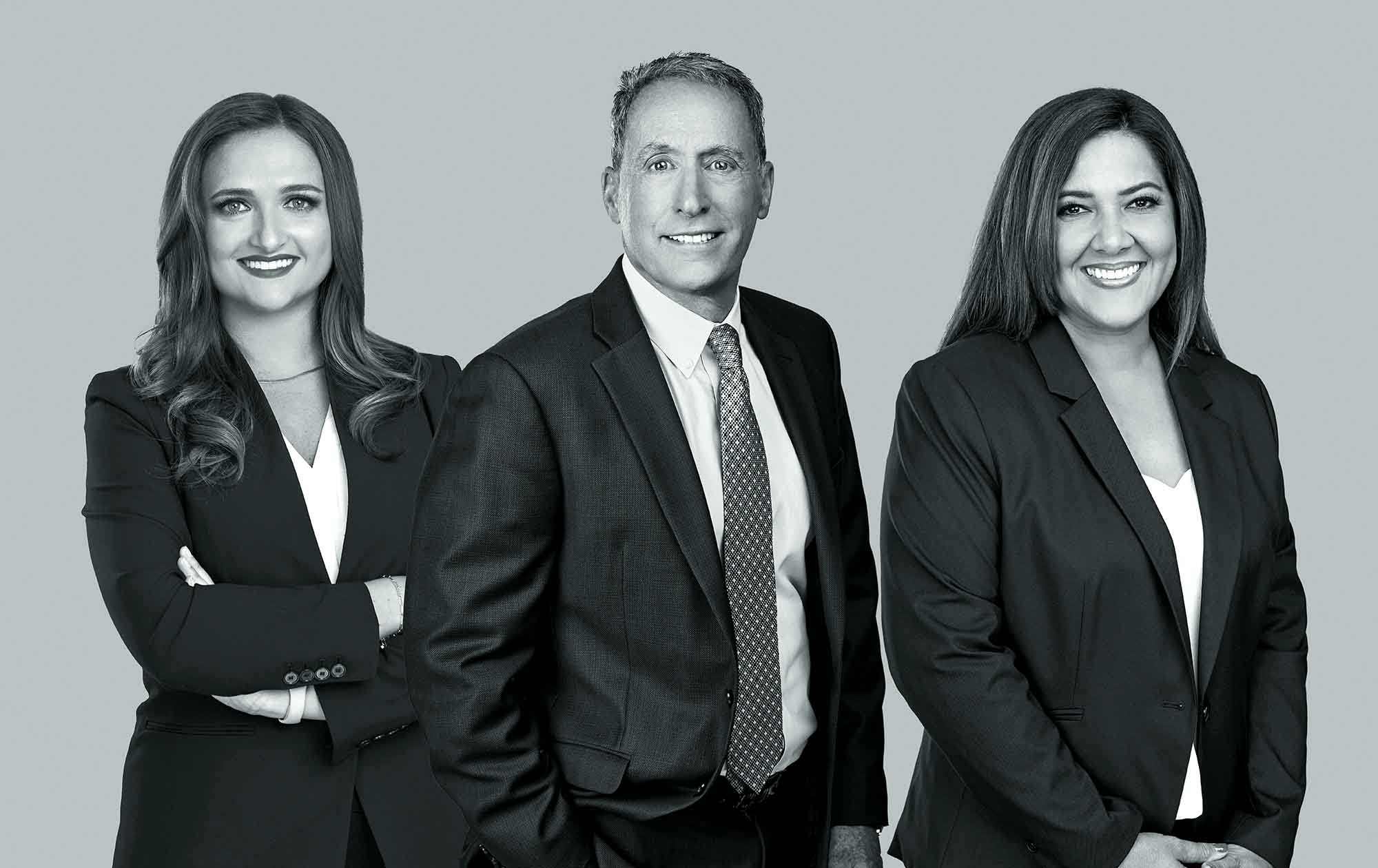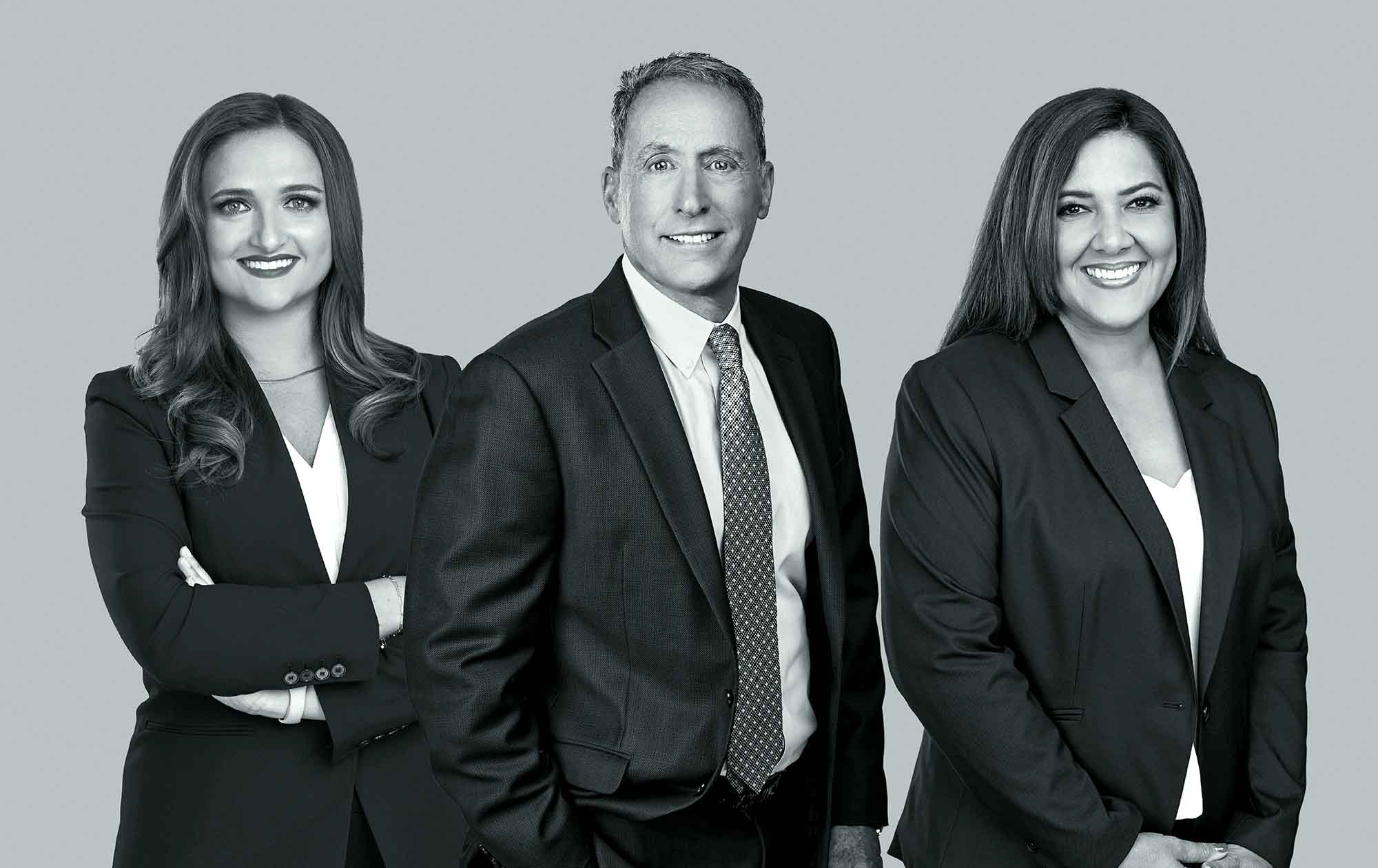California Insurance License Defense Attorney
If you are an insurance agent or broker facing a California Department of Insurance (CDI or DOI) investigation, accusation, or criminal charge, you need an experienced and respected California insurance license defense attorney by your side as early as possible.
Interactions with DOI investigators and attorneys can be nerve-racking and involve severe risks to your license, business, and reputation. It is easy for you or your staff to make mistakes that can unintentionally incriminate you or weaken your defense.
Former Deputy Attorney Generals now defending you
Chudnovsky Law’s renowned team of California insurance agent defense attorneys includes three former Deputy Attorney Generals from the Department of Justice with 30+ years of experience prosecuting license investigation and accusation cases.
Our attorneys, Gillian Friedman, Brian Bill, Craig Menchin, Melissa DuChene and Robert Weinberg, have decades of experience handling thousands of insurance license defense, investigation, insurance fraud, DUI defense, and criminal defense cases. We are known and respected by the investigators, CDI attorneys, and administrative law judges who handle insurance license cases.
We have extensive experience resolving even the most complex cases for every type of insurance agent, broker, agency, and insurance company.




CONTENTS
- The 5 stages in license defense
- 1. Complaint or criminal charge
- 2. Investigation, interview
- 3. Accusation
- 4. Administrative hearing
- 5. Appeal
- Criminal and DUI defense
- Self-reporting requirements
- DOI Enforcement Branch overview
- Types of licenses we handle
- Frequently asked questions
- About our attorneys





Our California insurance agent and broker license defense attorney can assist you in understanding and resolving any issue affecting your license or application, including:
- Department of Insurance investigation
- Accusation
- Mandatory reporting of a criminal conviction
- Consent application (§ 1033) for applicants with a felony conviction
- License suspension due to pending criminal case (§ 1748.5)
- License denial with Statement of Issues
- Request for Assistance (RFA) form investigation
- Insurance agent criminal defense
- Termination of insurance carrier appointment for cause
- Discipline out of state or on other licenses
- Fraud, misrepresentation, or mishandling allegations
- Insurance code violations
We understand the stress you are feeling and our DOI insurance defense attorney is 100% focused on protecting you and your license. We do not judge, we are only here to help.
If you would like the best outcome possible, call (844) 325-1444. Our experienced insurance license lawyer will vigorously defend you and your license.
We represent insurance licensees throughout all of California, including Los Angeles County, Orange County, Riverside County, San Bernardino County, San Diego County, Santa Barbara County, Santa Clara County, Alameda County, Sacramento County, Contra Costa County, and Ventura County.
We offer affordable fees and flexible payment plans.

The 5 stages of insurance license defense
Insurance license defense is the legal practice of defending insurance agents and brokers at 5 stages of disciplinary actions: [1] Complaint or crime, [2] Investigation, [3] Accusation, [4] Administrative Hearing, and [5] Writ Appeal.
Our California insurance license defense attorney specializes in defending licensees in front of the California Department of Insurance. Insurance agents are subject to professional standards defined in the California Insurance Code. If you need legal help, call (844) 325-1444 to speak with a lawyer.
Insurance licensees can face discipline at different stages. New license applications can be denied due to a criminal record, false statements on the application, disciplinary action in another state or on a different license, or irregular behavior during the insurance license exam process.
For existing licensees, the most common causes of disciplinary actions are:
- Violating the California Insurance Code
- Insurance fraud or misrepresentation
- False accusations and complaints
- Criminal offenses, arrests, or convictions
Insurance disciplinary actions have five stages:
1. Complaint or criminal charge
California Department of Insurance enforcement activity begins when the DOI receives one of the following notifications:
- A Suspected Fraudulent Claim (SFC) complaint filed by an insurance carrier, informant, witness, law enforcement, or the public
- Notice of a criminal charge, arrest, or conviction
- Disciplinary action on an out-of-state insurance license
- Disciplinary action on a different license, such as real estate or notary.
While the vast majority of SFCs are generated by the insurance industry, complaints can be filed online by anyone, including anonymous parties for alleged violations of laws, regulations, and professional standards. The standards for referring an SFC are when an insurance carrier “believes,” has “reason to believe,” or “has reason to suspect” that insurance fraud has occurred.
If the DOI suspects a violation of the California Insurance Code, California Business and Professions Code, California Code of Regulations, California Penal Code, or Title 18 of the US Code, the complaint will be referred to one of the Investigation Division’s nine regional offices.
If you have been arrested for DUI or any alleged crime, it is critical to hire an expert criminal defense attorney knowledgeable about insurance license law.
Important Note: The period after arrest for a crime is a crucial opportunity to protect your license. Every effort needs to be made to get the charge reduced or dismissed.
Robert Weinberg, Brian Bill, Craig Menchin, and Melissa DuChene are experienced insurance license lawyers and criminal defense attorneys. They have over 80 years of experience resolving DUI and criminal charges for licensed professionals while balancing plea, disclosure, and other considerations key to protecting your insurance license.
2. Investigation, interview
You will typically first become aware of an insurance license investigation when a DOI investigator contacts you to set an interview or you receive an enforcement subject letter that:
- Provides legal notice of an investigation or inquiry
- Requests an interview or records
- Requests employment records release authorization.
DOI investigators are former police officers, forensic experts, and experienced investigators with years of experience in the art of interrogation and conducting investigations. They often appear friendly, casually asking to “hear your side of the story.” In reality, they are meticulously building their case against you.
If you’ve been contacted by DOI or CDI investigators, call our California Department of Insurance investigation attorney at (844) 325-1444. We will help you carefully develop a strategy and response that doesn’t unintentionally incriminate you or weaken your defense. Representation by an experienced insurance license defense lawyer can greatly increase the odds of resolving your case in the investigation phase with no disciplinary action.
Important Note: If your case can be resolved in the investigation stage, the allegation against you will not be published on the DOI website.
3. Accusation filed
Once the Department of Insurance files a Formal Accusation before the Insurance Commissioner against your license, it will become a public record published on the DOI website. An Accusation is a formal pleading document by the DOI outlining why they wish to suspend, revoke, or have you voluntarily surrender your insurance license. It may also seek financial compensation for financially injured parties. The DOI can also refer a matter to the appropriate prosecutor’s office for criminal prosecution.
Once you receive the Accusation, you usually have 15 days to respond or you may lose your license via a default decision. If you retain our DOI defense lawyer to resolve your case, we need to quickly file a ‘Notice of Defense’ to begin a dual defense track:
- Negotiate: Carefully negotiate the best terms possible for a Stipulation and Waiver Settlement with the CDI Attorney. If terms can be reached that you agree with, a Stipulation and Waiver Order will be executed to resolve the matter. The order will outline the terms you will abide by in order to keep your license.
- Prepare for Hearing: If needed, prepare for a Hearing with the Department of Justice, Office of Administrative Hearings (OAH).
Receiving a Formal Accusation can be a devastating experience – especially for professionals who work so hard to help their clients. This is when the expert counsel of an experienced insurance license defense lawyer can guide your response. We have decades of experience successfully representing licensees in the same exact situation.
You can utilize our experience to inform your decision making process, develop holistic defense strategies, and secure the best outcome possible. We work diligently to present you in the best possible light, identify weaknesses in the Department’s case, and explain how you are so much more than the list of allegations described in the Accusation.
If you have received an Accusation, contact us as soon as possible to review your case and preserve your rights to defend yourself.
4. Administrative Hearing
If your matter cannot be resolved negotiation, an Administrative Hearing will be necessary at the Office of Administrative Hearings (OAH) in Los Angeles, Oakland, Sacramento, or San Diego. This is a legal proceeding with a presiding Administrative Law Judge deciding the merits of your case and your fate.
The hearing will occur at OAH with a Judge, your counsel, and a CDI Attorney with many years of experience. Both sides will be able to argue their case and present evidence subject to the rules of evidence. The Judge will take the information presented under consideration and has 30 days to render a decision (CA Govt Code § 11517). The most common outcome of a hearing is the retention of the license subject to some form of probationary terms.
Gillian Friedman, Brian Bill, Robert Weinberg, Melissa DuChene, and Suzanne Crouts have over 100 years of experience representing clients in OAH, California Superior Courts, and U.S. Federal Courts for professional license and criminal matters. They have handled over 8,000 cases and hearings, and are prepared to vigorously defend you and skillfully challenge any evidence presented.
5. Writ appeal
If you have an adverse ruling in an OAH Hearing, a writ of mandamus (mandate) provides a method of appealing the decision in California Superior Court. A licensee usually has 30 days from the effective date of the OAH decision to file the writ petition in Superior Court.
If your lawyer believes errors were made in the OAH Judge’s ruling, a writ of mandamus can provide relief. If a writ petition does not produce a favorable ruling, the next venue with jurisdiction is the California Court of Appeals. Appeals are a highly technical area of law with complex timelines, evidentiary, and scope of review limitations.
Call us at (844) 325-1444 to review your options and how we can help protect you at every stage of insurance license defense.
Insurance criminal defense attorney
Criminal charges, law enforcement investigations, DUI, and criminal convictions create serious risks to your California insurance license. Even minor misdemeanor offenses can trigger license investigations and disciplinary actions that put your livelihood in danger.
It is critical to hire an insurance agent criminal defense attorney or DUI lawyer who is an expert in both insurance license and criminal law. Insurance licensees have unique defense requirements that must be carefully executed to achieve the best possible outcome.
Robert K. Weinberg, Brian Bill, Craig Menchin, and Melissa DuChene are rare insurance agent defense attorneys with expertise in both professional license defense and criminal defense. They are adept at handling all professional license defense cases while navigating the complex intersection of federal and California administrative and criminal laws. They have over 80 years of experience defending insurance professionals facing every kind of criminal matter, including:
- All misdemeanor and felony charges
- Insurance fraud
- State and Federal criminal investigations
- Premium theft
- Senior citizen abuses
- Health insurance violations
- Unauthorized insurers and insurance transactions
- Deceptive sales and marketing practices
- Public adjuster violations
- Title insurance rebates
- Abusive acts committed by auto insurance agents and companies
- Illegal bail practices
- DUI, felony DUI
- Domestic violence
- Sex crimes, sexual misconduct
Insurance license criminal charges need to be carefully resolved in a way that balances plea and other license considerations critical to protecting your license.
The period immediately after you become aware of a criminal charge or investigation is a critical window to make every effort to get the investigation closed and the charge reduced or dismissed.
If you are under investigation or have been arrested for any alleged criminal offense, contact as early as possible in the process to schedule a consultation to review your case and actions needed to protect your license and career.
Self-reporting requirements
Insurance agents, brokers, and business entities are required to self-report within 30 days of a change in background information. The reportable events defined in Insurance Code section 1729.2 include:
- A misdemeanor or felony conviction.
- A filing of felony criminal charges in state or federal court
- An administrative action regarding a professional or occupational license
- Any licensee’s discharge or attempt to discharge, in a personal or organizational bankruptcy proceeding, an obligation regarding any insurance premiums or fiduciary funds owed to any company, including a premium finance company, or managing general agent
- Any admission, or judicial finding or determination, of fraud, misappropriation or conversion of funds, misrepresentation, or breach of fiduciary duty.
Who must self-report
This self-reporting requirement applies to:
- Any resident and nonresident producer licensees and applicants who intend to transact in the business of insurance. This includes officers, directors, partners, members, or controlling persons under any resident or nonresident business entity license or an application thereof.
- Unlicensed officers, directors, partners, members or controlling persons, or any other natural person named under the business entity or an application thereof.
Self-reporting adverse changes will typically trigger a DOI investigation and reevaluation of the suitability of the licensee. It is highly recommended to have an expert insurance license lawyer draft and file the disclosure. Our counsel will work to mitigate and explain the required disclosure to give you the best chance of preserving your license.
If these scenarios apply to you, contact us as early as possible to review your case and how we can help.
DOI Enforcement Branch overview
The Enforcement Branch is the investigative division of the California Department of Insurance. Enforcement investigates criminal and regulatory violations relating to insurance transactions from the point of sale throughout the claims process.
The Enforcement Fraud Division is staffed by over 266 investigative staff in nine regional offices in order to investigate four main areas:
- Workers’ compensation insurance fraud
- Property, life, and casualty fraud
- Disability and healthcare insurance fraud
- Automobile insurance fraud
Fraud Division detectives investigate crimes related to the California Insurance Code, Section 550 of the Penal Code, and suspected crimes such as conspiracy, grand theft, and automobile theft statutes.
The Enforcement Investigation Division has more than 90 staff that screen and investigate complaints the DOI receives about the following issues:
- Premium theft
- Health insurance violations
- Illegal bail activity
- Deceptive sales and marketing practices
- Unauthorized insurers and insurance transactions
- Public adjuster misconduct
- Title insurance rebates and kickbacks
- Senior citizen abuse
- Abusive acts by automobile insurance agents
- Other insurance-related fraud
Enforcement pursues prosecution of offenders through both regulatory and criminal justice systems. For serious or complex cases, or when the need arises, the Investigation Division will partner with local prosecutors and state or federal agencies, including the Franchise Tax Board, the US Postal Inspection Service, and the FBI.
We represent all California insurance licensees
There are many classes of insurance licenses with varying requirements and qualification standards. We represent all classes of insurance licensees including:
- Accident and Health or Sickness
- Adjuster
- Apprentice Public Insurance Adjuster
- Crop Insurance Adjuster
- Public Insurance Adjuster
- Administrator
- Automobile Insurance Agent (Limited Lines)
- Bail Agent
- Bail Fugitive Recovery Agent
- Bail Permittee
- Bail Solicitor
- Car Rental
- Cargo Shippers’ Agent
- Casualty Broker-Agent
- Credit Insurance Agent
- Life Agent (Life, Accident and Health or Sickness)
- Life and Disability Insurance Analyst
- Life-Limited To The Payment of Funeral And Burial Expenses
- Life
- Life Settlement Broker
- Life Settlement Provider
- Motor Club
- Part-Time Fraternal Agent
- Personal Lines Broker-Agent
- Portable Electronics Insurance Agent
- Property and Casualty Broker-Agent
- Property Broker-Agent
- Reinsurance Intermediary-Broker/ IntermediaryManager
- Self-Service Storage Agent
- Special Lines’ Surplus Line Broker
- Surplus Line Broker
- Stock Agent
- Travel Insurance Agent (Limited Lines)
- Title Marketing Representative
- Vehicle Service Contract Provider
Frequently asked questions
What should I do if contacted by a DOI investigator?
Once you become aware that you’re the subject of investigation, you should hire an experienced insurance license defense attorney as early as possible. Your number one goal is to get the matter closed with no action.
Your attorney will step in between you and the investigator to make sure all communication is carefully managed and documented, misunderstandings are cleared up, and your responses address any agency concerns in the most effective way possible.
DOI investigators can be very intimidating and you can feel harassed by their intrusive and aggressive tactics. It’s important to remember that anything you say to an investigator can be used as evidence against you later in a disciplinary action or criminal prosecution.
Representation by an experienced defense attorney can greatly increase the odds of resolving your case in the investigation phase with no disciplinary action.
What should I do if I receive a DOI Accusation?
Once a formal Accusation is filed, you only have 15 days from the date it is sent to file a Notice of Defense to preserve the right to defend yourself. If you don’t file timely, the DOI can deem that you waive the right to defend yourself and proceed to a default decision and license revocation.
Upon becoming aware an Accusation has been filed, you should contact us as soon as possible to properly file and document the Notice of Defense and start on your defense.
Will a criminal conviction cause my insurance license to be revoked?
A criminal conviction triggers mandatory self-reporting and evaluation of your suitability for licensure. The self-report submitted is a key opportunity to explain the conviction in the best way possible to demonstrate to the DOI that you are of good moral character, and that you are safe to practice and maintain insurance licensure.
The effect of a criminal conviction disclosure on your license will vary widely based on the charge, description of what happened, police report, and mitigation information supplied to the DOI. Possible outcomes include no action taken, a letter of reprimand and fine, filing of an Accusation, probation, or license revocation.
The Department of Insurance monitors licensee criminal records and quickly receives electronic notification of arrests, charges, and convictions. If the mandatory self disclosure does not occur timely, the DOI can proceed directly to filing an Accusation and license revocation.
If it looks like you’re going to be convicted of any crime, ideally contact us before conviction to review your scenario and how we can help.
What should I do if my insurance license is denied?
CDI has special procedures to appeal licensure denial and the ensuing Statement of Issues. Chudnovsky Law has extensive experience in successfully appealing license denials. If your license is denied, please contact us to quickly evaluate your situation and Statement of Issues.
How does a felony affect my insurance license?
Felony charges are required to be self-reported within 30 days of indictment, even before conviction. A pending felony case can trigger a 1748.5 suspension order. A felony conviction can trigger a requirement to obtain a 1033 written consent for licensure.
Dealing with felony criminal matters is complex with special administrative procedures and statutory requirements. Chudnovsky Law has extensive experience resolving these difficult matters favorably.
What happens if an insurance carrier terminates my appointment for cause?
If an insurance carrier believes an insurance broker or insurance producer has violated a state regulation or law, the carrier can terminate the appointment “for cause”. In most instances, the carrier is required to file additional disclosures with the Department of Insurance explaining the termination and cooperate in a disciplinary action against the insurance broker.

About our attorneys
Chudnovsky Law is a team of experienced insurance license defense and criminal defense lawyers. The firm is rated Top 100 Trial Lawyers by The National Trial Lawyers, an honor only given to an elite group of lawyers for exceptional skills and qualifications in the practice of law.
With decades of experience as a former Deputy Attorney General in the Department of Justice, prosecuting license disciplinary actions, our team has an unparalleled understanding of Department of Insurance enforcement actions and tactics. We have the invaluable experience you need when facing high-stakes investigation and accusation proceedings.
The firm’s insurance license defense attorneys, Gillian Friedman, Craig Menchin, Melissa DuChene, and Robert Weinberg have a combined 80+ years of experience practicing law. They are known and respected by clients, investigators, prosecutors, and judges as honest, compassionate, and highly capable advocates for insurance licensees. We take a comprehensive, holistic approach to defending professionals and employ every resource we have to secure a favorable outcome.
Our lawyers have handled over 8,000 cases, Department of Insurance hearings, and court trials for professional license defense, federal, and state criminal defense matters. They are legal authorities in the complex intersection of licensing and criminal law for all insurance licensees.
A dedication to client service and delivering results has made Chudnovsky Law amongst the top-rated insurance license defense attorneys in California:
- 5 Star Rating by Martindale
- 5 Star Rating by Lawyers
- 5 Star Rating on Google
- 5 Star Rating on Findlaw
- 10.0 Superb Rating on Avvo
To speak with an attorney about your case and see if we are the best insurance agent defense attorneys for you, call (844) 325-1444 to contact us.
Client Testimonials
“I am very satisfied with Melissa Duchene’s representation. She helped me navigate the legal issues and build an excellent case.
It is very intimidating to defend yourself with the Department of Insurance. They hold your insurance license and livelihood in their hands, but Melissa was by my side throughout the whole process and she did an excellent job of defending me. I would definitely recommend her to friends and would use her again (I hope not!) if I got in a similar situation.”
“After the Department of Insurance denied my license application in 2019, Suzanne Crouts appealed the denial and was able to overcome their issues and get a restricted insurance license for me. She recently helped me get the license restrictions fully removed. I am VERY HAPPY with her services and wholeheartedly recommend her to anyone that needs an outstanding professional license defense attorney. She does exactly what she says she’ll do in a professional and competent manner.”
YELP
“I found Chudnovsky Law by word of mouth from another attorney. Melissa Duchene made herself available immediately when we were dealing with an urgent Dept of Insurance license issue. She is very steady and a straight shooter. Even though my situation was serious and sensitive, her manner was very reassuring, compassionate and strategic. I could tell she has a lot of experience resolving challenging and sensitive issues. She’s very knowledgeable and always gave great and thoughtful advice. She also was never rushed or distracted and made me feel like I had 100% of her focus, which isn’t how a lot of lawyers operate. Thank you Melissa for your expertise and guidance, I really appreciate you and the results you delivered!”
Service Area
When looking for an insurance license defense attorney near me, please note we represent clients in Los Angeles County, Orange County, Riverside County, San Bernardino County, San Diego County, Santa Clara County, Alameda County, Sacramento County, Contra Costa County, and all of California, including:
Los Angeles County: Agoura Hills, Alhambra, Arcadia, Baldwin Park, Bellflower, Beverly Hills, Brentwood, Buena Park, Burbank, Canoga Park, Carson, Cerritos, Chatsworth, Compton, Culver City, Diamond Bar, Downey, Downtown Los Angeles, El Monte, El Segundo, Encino, Gardena, Glendora, Glendale, Granada Hills, Hawthorne, Hermosa Beach, Hollywood, Huntington Park, Inglewood, La Canada-Flintridge, La Habra, La Mirada, Lakewood, Lancaster, Long Beach, Los Angeles, Lynwood, Malibu, Manhattan Beach, Monrovia, Montebello, Monterey Park, North Hollywood, Northridge, Norwalk, Pacoima, Palmdale, Pasadena, Pico Rivera, Pomona, Rancho San Fernando, Redondo Beach, Reseda, Rosemead, San Dimas, San Fernando Valley, Santa Clarita, Santa Monica, Sherman Oaks, Simi Valley, South Pasadena, Sylmar, Tarzana, Thousand Oaks, Toluca Lake, Torrance, Van Nuys, Venice, Walnut, West Covina, West Hollywood, Whittier and Woodland Hills.
· · ·
Orange County: Aliso Viejo, Anaheim, Brea, Buena Park, Costa Mesa, Cypress, Dana Point, Fountain Valley, Fullerton, Garden Grove, Huntington Beach, Irvine, La Habra, La Palma, Laguna Beach, Laguna Hills, Laguna Niguel, Laguna Woods, Lake Forest, Los Alamitos, Mission Viejo, Newport Beach, Orange, Placentia, Rancho Santa Margarita, San Clemente, San Juan Capistrano, Santa Ana, Seal Beach, Stanton, Tustin, Villa Park, Westminster and Yorba Linda.
· · ·
Riverside County: Riverside, Moreno Valley, Corona, Temecula, Murrieta, Jurupa Valley, Indio, Hemet, Perris, Palm Desert and Palm Springs. | San Bernardino County: San Bernardino, Fontana, Rancho Cucamonga, Ontario, Victorville, Rialto, Hesperia, Chino, Upland, Apple Valley and Redlands. | San Diego County: San Diego, Chula Vista, Oceanside, Escondido, Carlsbad, El Cajon, Vista, San Marcos, Encinitas and National City.
· · ·
Santa Barbara County: Carpinteria, Gaviota, Goleta, Isla Vista, Lompoc, Los Olivos, Montecito, Orcutt, Santa Barbara, Santa Maria, Santa Ynez, Solvang, and UC Santa Barbara. | Ventura County: Camarillo, Fillmore, Simi Valley, Ojai, Oxnard, Port Hueneme, Thousand Oaks, and Ventura.
· · ·
Alameda County: Alameda, Albany, Berkeley, Dublin, Emeryville, Fremont, Hayward, Livermore, Newark, Oakland, Piedmont, Pleasanton, San Leandro, Union City. | Alpine County: Alpine Village. | Amador County: Ione, Jackson, Plymouth, Sutter Creek. | Butte County: Oroville, Chico, Durham, Gridley, Magalia, Oroville, Oroville East, Palermo, Paradise, South Oroville, Thermalito. | Calaveras County: Angels Camp, Arnold, Copperopolis, Rancho Calaveras, San Andreas, Valley Springs. | Colusa County: Arbuckle, Colusa, Maxwell, Williams. | Contra Costa County: Antioch, Brentwood, Concord, Danville, El Cerrito, Hercules, Lafayette, Martinez, Oakley, Orinda, Pinole, Pittsburg, Pleasant Hill, Richmond, San Pablo, San Ramon, Walnut Creek. | Del Norte County: Crescent City, Bertsch-Oceanview, Klamath. | El Dorado County: Cameron Park, Diamond Springs, El Dorado Hills, Placerville, Pollock Pines, Shingle Springs, South Lake Tahoe.
· · ·
Fresno County: Clovis, Coalinga, Fresno, Reedley, Sanger, Selma. | Glenn County: Hamilton City, Orland, Willows. | Humboldt County: Arcata, Cutten, Eureka, Fortuna, Humboldt Hill, McKinleyville, Myrtletown, Ridgewood. | Imperial County: Brawley, Calexico, Calipatria, El Centro, Imperial, Salton City. | Inyo County: Big Pine, Bishop, Lone Pine, West Bishop. | Kern County: Arvin, Bakersfield, California City, Delano, McFarland, Ridgecrest, Shafter, Taft, Tehachapi, Wasco. | Kings County: Avenal, Concoran, Hanford, Lemoore, Lemoore Station. | Lake County:Clearlake, Clearlake Oaks, Clearlake Riviera, Kelseyville, Lakeport, Lucerne, North Lakeport. | Lassen County: Janesville, Susanville, Westwood. | Madera County: Ahwahnee, Bonadelle Ranchos, Chowchilla, Coarsegold, Madera, Madera Acres, Madera Ranchos, Yosemite Lakes. | Marin County: Corte Madera, Larkspur, Marin, Mill Valley, Novato, San Anselmo, San Rafael, Sausalito. | Mariposa County: Lake Don Pedro, Mariposa, Midpines, Yosemite Valley. | Mendocino County: Brooktrails, Fort Bragg, Redwood City, Ukiah, Willits. | Merced County:Atwater, Dehli, Dos Palos, Franklin, Gustine, Livingston, Los Banos, Merced, Winton. | Modoc County: Alturas, California Pines. | Mono County: Crowley Lake, Mammoth Lakes.
· · ·
Monterey County: Carmel Valley, Carmel-by-the-Sea, Castroville, Gonzales, Greenfield, King City, Marina, Monterey, Pacific Grove, Salinas, Seaside, Soledad. | Napa County: American Canyon, Calistoga, Napa, St Helena, Yountville. | Nevada County: Grass Valley, Lake of the Pines, Lake Wildwood, Nevada City, Truckee. | Placer County: Auburn, Granite Bay, Lincoln, Loomis, North Auburn, Rocklin, Roseville. | Plumas County: Chester, East Quincy, Portola, Quincy. | Sacramento County: Antelope, Arden-Arcade, Carmichael, Citrus Heights, Elk Grove, Fair Oaks, Florin, Folsom, Foothill Farms, Galt, North Highlands, Orangeville, Rancho Cordova, Rosemont, Sacramento, Vineyard. | San Benito County: Aromas, Hollister, Ridgemark.
· · ·
San Francisco County: Bayview, Chinatown, Japan Town, Mission District, Pacific Heights, Richmond District, San Francisco, Stonestown, Sunset District, Union Square. | San Joaquin County: Lathrop, Lodi, Manteca, Ripon, Stockton, Tracy. | San Luis Obispo County: Arroyo Grande, Atascadero, Grover Beach, Morro Bay, Paso Robles, Pismo Beach, San Luis Obispo. | San Mateo County: Belmont, Burlingame, Daly City, East Palo Alto, Foster City, Half Moon Bay, Hillsborough, Menlo Park, Millbrae, Pacifica, Redwood City, San Bruno, San Carlos, San Mateo, South San Francisco.
· · ·
Santa Clara County: Campbell, Cupertino, Gilroy, Milpitas, Morgan Hill, Mountain View, Palo Alto, San Jose, Santa Clara, Sunnyvale. | Santa Cruz County: Aptos, Ben Lomond, Capitola, Interlaken, Live Oak, Rio Del Mar, Santa Cruz, Scotts Valley, Soquel, Watsonville. | Shasta County: Anderson, Bella Vista, Cottonwood, Happy Valley, Palo Cedro, Redding, Shasta Lake. | Sierra County: Loyalton, Sierra Brooks. | Siskiyou County: Dunsmuir, Lake Shastina, Mount Shasta, Weed, Yreka. | Solano County: Benicia, Dixon, Fairfield, Suisun City, Vacaville, Vallejo. | Sonoma County:Healdsberg, Petaluma, Rohnert Park, Santa Rosa, Sonoma, Windsor. | Stanislaus County: Ceres, Modesto, Oakdale, Patterson, Riverbank, Salida, Turlock. | Sutter County: Live Oak, Sutter, Yuba City. | Tehama County: Corning, Lake California, Los Molinos, Red Bluff. | Trinity County: Hayfork, Lewiston, Post Mountain, Weaverville. | Tulare County: Dinuba, Exeter, Farmersville, Lindsay, Porterville, Tulare, Woodlake, Visalia. | Tuolumne County: Jamestown, Mono Vista, Phoenix Lake, Sonora. | Yolo County: Davis, West Sacramento, Winters, Woodland. | Yuba County: Linda, Loma Rica, Marysville, Olivehurst, Plumas Lake, Wheatland.
Disclaimer
This information does not constitute legal advice and is not a substitute for individual case consultation and research. No representations are made as to the accuracy of this information and appropriate legal counsel should be consulted before taking any actions. Contact us for a consultation regarding your case to see if we are the best defense attorneys for you.





